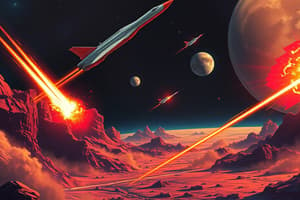Podcast
Questions and Answers
What is the United Nations?
What is the United Nations?
- A type of economic plan
- A military alliance
- A political party
- An international organization formed after WWII (correct)
What does the term 'Iron Curtain' refer to?
What does the term 'Iron Curtain' refer to?
A political barrier that isolated Eastern Europe after WWII
What is Containment?
What is Containment?
American policy of resisting further expansion of communism
What was the Truman Doctrine?
What was the Truman Doctrine?
What was the Marshall Plan?
What was the Marshall Plan?
What does 'Cold War' refer to?
What does 'Cold War' refer to?
What is NATO?
What is NATO?
What was the Warsaw Pact?
What was the Warsaw Pact?
What is brinkmanship?
What is brinkmanship?
What happened at the Yalta Conference?
What happened at the Yalta Conference?
Who were 'The Big Three'?
Who were 'The Big Three'?
What was the Berlin Airlift?
What was the Berlin Airlift?
Who was Mao Zedong?
Who was Mao Zedong?
Who was Jiang Jieshi?
Who was Jiang Jieshi?
What was the Long March?
What was the Long March?
What is a commune?
What is a commune?
Who were the Red Guards?
Who were the Red Guards?
What was the Great Leap Forward?
What was the Great Leap Forward?
What was the goal of the Cultural Revolution?
What was the goal of the Cultural Revolution?
What happened in Tiananmen Square in 1989?
What happened in Tiananmen Square in 1989?
What is the People's Republic of China?
What is the People's Republic of China?
What is the Republic of China?
What is the Republic of China?
What was the Korean War?
What was the Korean War?
Flashcards are hidden until you start studying
Study Notes
United Nations
- Formed after WWII to promote international peace, security, and cooperation among nations.
Iron Curtain
- A political barrier that restricted travel and communication between Eastern Europe and the West post-WWII.
Containment
- U.S. policy aimed at preventing the spread of communism globally.
Truman Doctrine
- Introduced in 1947, it provided economic and military support to countries threatened by communism, especially Greece and Turkey.
Marshall Plan
- A U.S. initiative (1948-1952) for European economic reconstruction post-WWII, offering substantial financial aid.
Cold War
- A prolonged geopolitical tension between the U.S. and the Soviet Union, characterized by indirect conflict and military threats without direct warfare.
NATO
- North Atlantic Treaty Organization; a military alliance formed to provide collective defense against aggressors, involving U.S., Canada, and several Western European nations.
Warsaw Pact
- A military alliance established by the Soviet Union with Eastern European nations in response to NATO.
Brinkmanship
- A term coined in 1956 by Secretary of State John Dulles, referring to the policy of risking escalation to the brink of war to protect national interests.
Yalta Conference
- A 1945 meeting of FDR, Churchill, and Stalin to discuss post-war plans and the reorganization of Europe after WWII.
The Big Three
- Refers to Churchill, Roosevelt, and Stalin, who coordinated military strategies against Germany and Japan during WWII and later discussed post-war Europe.
Berlin Airlift
- A 1948 operation that provided essential supplies to West Berlin's residents when the Soviet Union blocked ground access.
Mao Zedong
- (1893-1976) Leader of the Chinese Communist Party who established the People's Republic of China in 1949 after defeating the Nationalists.
Jiang Jieshi
- (1887-1975) Leader of the Nationalist Party (Guomindang) in China, he was opposed to communism and fled to Taiwan after losing the civil war to Mao.
Long March
- A strategic retreat of approximately 6,000 miles (9,600 km) taken by Chinese Communists in 1934 to escape the Nationalist forces led by Chiang Kai-shek.
Commune
- A collective community where land and resources are jointly owned and members collaborate in living and working together.
Red Guards
- Youth groups mobilized by Mao during the Cultural Revolution, known for their radical actions and enforcement of Maoist ideology.
Great Leap Forward
- A 1958 initiative by Mao aimed at rapid economic development and socialist transformation that resulted in widespread famine and the starvation of over 20 million people.
Cultural Revolution
- A political campaign initiated by Mao to eliminate opposition within the Communist Party and instill revolutionary ideals among the youth.
Tiananmen Square
- The site in Beijing where protests in 1989 for political reform occurred, which were violently suppressed by the military.
People's Republic of China
- Established by Mao Zedong in 1949, it is ruled by the Communist Party of China and operates under a socialist republic model.
Republic of China
- The Nationalist government established by the U.S. after WWII, located on Taiwan.
Korean War
- A conflict (1950-1953) between communist North Korea and non-communist South Korea, with military involvement from the United Nations led by the United States.
Studying That Suits You
Use AI to generate personalized quizzes and flashcards to suit your learning preferences.




